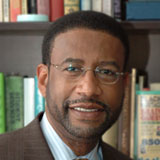Ronald Carter
Professional Bio:
Dr. Ronald L. Carter, a native of High Point, N.C., became the 13th president of Johnson C. Smith University on July 1, 2008. With more than 30 years serving students and universities, Dr. Carter brings an impressive record of community leadership, academic administration, and budget management to the position.
Upon graduating magna cum laude, Phi Beta Kappa, with a Bachelor of Arts degree in sociology and philosophy from Morehouse College in 1971, Dr. Carter began his distinguished career at Boston University’s Martin Luther King Jr. Center, where by 1981, he rose to become the school’s youngest dean of students. While at Boston University, Dr. Carter pursued graduate studies, earning both a Master of Theology degree and a Ph.D. in philosophy of religion. In the late 1980s, Dr. Carter’s interaction with relatives of Nelson Mandela compelled him to put his abilities to work in South Africa.
Prior to Mandela’s release from prison in 1990 and the abolition of apartheid, Dr. Carter was named senior administrator of the Health Services Development Unit at the University of the Witwatersrand in Johannesburg, South Africa. Within five years at the university, he again defied the status quo by becoming the school’s dean of students— and one of the first black administrators at the traditionally white institution. As dean of students, he created and received funding for the Wits Black Schools Partnership Programme that brought the university together with more than 4,000 high school students to enhance learning in township schools that were disadvantaged by apartheid. In addition, he helped raise $500,000 to support an initiative between the BookSmart Foundation and the university to provide five computer centers and more than four million books to children, schools, and libraries in South African townships.
Dr. Carter returned to the United States in 1997 as the provost and dean of faculty at Coker College in Hartsville, S.C. His almost 11-year tenure at Coker College included key roles in the private liberal arts college’s strategic planning, academic and student development, financial management, and fund-raising. At Coker College he created a Distinguished International Visiting Scholars Program and a Distinguished Lecture Series. He also provided guidance and oversight for the college’s Center for Leadership and Community Development, which partnered the college with community-based organizations, governmental departments, and funding organizations. A conceptual framework he worked with at Coker College for assessing and evaluating student learning outcomes in general education has been published in Assessing Student Learning in General Education.


